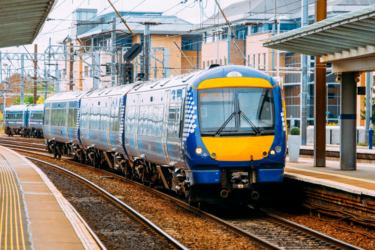Recent Release | 02 Nov 2022
The Economic, Environmental, and Social Opportunities that Rail Brings to the UK

Economic Consulting Team
Oxford Economics

A review of the wider benefits that UK rail delivers for passengers, commuters, job-seekers, and the environment.
The Economic, Environmental, and Social Opportunities that Rail Brings to the UK report shows how UK rail has the potential to deliver a wide range of benefits to passengers, commuters, job-seekers, and the environment. This complements our 2021 report The Economic Contribution of UK Rail.
The report, commissioned by RIA, shows that increased use of rail generates benefits for the UK economy by improving productivity and labour market outcomes:
- Time savings – public transport generates around £1.4 billion in time saving benefits every year for commuters in six of the UK’s largest cities from reduced congestion
- Higher wages – reducing journey times between Manchester and Leeds by 20 minutes could increase wages by approximately £600 per worker per year.
- Job opportunities – a 10% reduction in regional journey times could support from 1,950- 12,600 jobs dependent on the area. 5,900 jobs could be supported in Scotland, for example.
Rail also has a lower environmental impact than other modes of transport, and new technology will only reduce this:
- Low-carbon travel – by 2050 electric trains will produce 14 times fewer emissions than conventionally fuelled trains.
Finally, access to the rail system supports social mobility and improves public health:
- Public health – £115 million per year in healthcare cost savings could be generated by improving public transport in six of the UK’s largest cities.
- Access to services – in addition to the economic benefits from accessibility, those with better public transport links are more likely to have access to services and participate socially.
About the team
Our Economic Consulting team are world leaders in quantitative economic analysis, working with clients around the globe and across sectors to build models, forecast markets and evaluate interventions using state-of-the art techniques. Lead consultants on this project were:

James Bedford
Senior Economist, Economic Impact

Stephen Foreman
Associate Director, Economic Impact
You might be interested in

How to address skills mismatch for better productivity
Explore the challenges of labour productivity in Australia. Understand how skills mismatch affects economic growth and what can be done to improve outcomes.
Find Out More
Beyond Compliance: Closing the Scope 3 Data Gap in Australia’s Food and Grocery Sector
Australia’s climate conversation is shifting. With a more ambitious 2035 target on the horizon, the focus is moving from whether companies should act on emissions to how quickly and strategically they can do it.
Find Out More
Airbnb’s Economic Contribution to APAC in 2024: GDP, Jobs, and Regional Impact
Airbnb's platform connects hosts across Asia Pacific (APAC) with travellers from around the world. Oxford Economics was commissioned by Airbnb to quantify its economic footprint in 10 APAC markets in 2024.
Find Out More
The Future of Trade: Tariffs, Taxes, and Economic Trends
Amid ongoing global trade uncertainty, business leaders are struggling to plan ahead as new tariffs continue to reshape the market. Even so-called “locked-in” tariffs are proving to be temporary, adding to the unpredictability. Firms are cautious, waiting for clarity before committing to major investments. As global trade volumes decline, the importance of understanding every relevant trade tariff and accurately applying the correct HS code to imported goods becomes even more critical for managing costs and compliance.
Find Out More